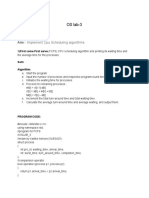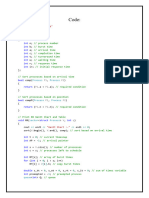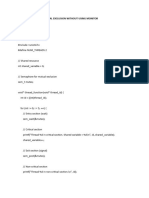0% found this document useful (0 votes)
100 views48 pagesOS Practical File
The document contains 6 questions related to operating system concepts like process creation using fork() and exec() system calls, obtaining kernel and CPU information from /proc files, file statistics using stat(), implementation of Round Robin and First Come First Serve scheduling algorithms. Code snippets in C/C++ are provided as answers to illustrate concepts like process scheduling, waiting time, turnaround time calculations.
Uploaded by
precious mCopyright
© © All Rights Reserved
We take content rights seriously. If you suspect this is your content, claim it here.
Available Formats
Download as DOCX, PDF, TXT or read online on Scribd
0% found this document useful (0 votes)
100 views48 pagesOS Practical File
The document contains 6 questions related to operating system concepts like process creation using fork() and exec() system calls, obtaining kernel and CPU information from /proc files, file statistics using stat(), implementation of Round Robin and First Come First Serve scheduling algorithms. Code snippets in C/C++ are provided as answers to illustrate concepts like process scheduling, waiting time, turnaround time calculations.
Uploaded by
precious mCopyright
© © All Rights Reserved
We take content rights seriously. If you suspect this is your content, claim it here.
Available Formats
Download as DOCX, PDF, TXT or read online on Scribd
/ 48
























































































